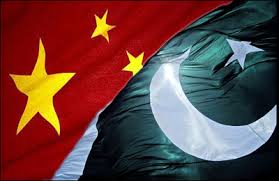- The likely fallout from a drying up of US economic and military assistance must remain
at the centre of Islamabad’spolicy formulation
Gulf News
Farhan Bokhari
 A major international defence exhibition, which is due to open in Karachi tomorrow, marks a timely opportunity for Pakistan to showcase its journey towards self-reliance in the face of significant odds. Whenever sanctioned by Washington during periods of lows in a checkered history of Pakistan’s relations with the United States, Islamabad’s choice of building up close ties with China has indeed paid off. Most of Pakistan’s successfully developed indigenous weapons systems have resulted from the uninterrupted support that the country has received from China.
A major international defence exhibition, which is due to open in Karachi tomorrow, marks a timely opportunity for Pakistan to showcase its journey towards self-reliance in the face of significant odds. Whenever sanctioned by Washington during periods of lows in a checkered history of Pakistan’s relations with the United States, Islamabad’s choice of building up close ties with China has indeed paid off. Most of Pakistan’s successfully developed indigenous weapons systems have resulted from the uninterrupted support that the country has received from China.
Held once every two years under the banner of International Defence Exhibition and Seminar (Ideas), the event in Karachi hosts a series of informative sessions alongside practical demonstrations of Pakistan’s indigenously produced weapons systems. Meanwhile, the Ideas event has also built up a well-respected reputation as a forum where weapon manufacturers from countries like China, Russia and Turkey have put their products on display, in search of customers.
For years, independent analysts have repeatedly urged the rulers in Islamabad to oversee a consolidation of the success story surrounding Pakistan’s engineering sectors, notably those with relevance to the country’s defence needs. Progress in manufacturing of defence-related systems must never be taken for granted.
In some cases, Pakistan has successfully built up its own production facilities to provide end-products to its armed forces at a fraction of the cost for comparable imports. Since the 1990s, Pakistan has pushed harder than before to manufacture big-ticket items such as a new fighter planes known as JF-17 ‘Thunder”, the home-built main battle tank known as ‘Al Khalid’ and different categories of small to mid-sized boats for naval deployments. And in the coming years, the drive towards indigenisation will witness China team up with Pakistan to provide eight new submarines for Pakistan Navy — four of which will be built at the Pakistan Navy-run Karachi Shipyard and Engineering Works.
The push to take Pakistan towards increasing self-sufficiency followed past experiences. In 1990, a US law known as the ‘Pressler’ amendment was used by some members of the US Congress to block further deliveries of new F-16 fighter planes to Pakistan. It was a complete reversal of a carefully-constructed relationship in the 1980s when the US generously supported Pakistan as Washington’s bulwark against the occupation of Afghanistan by the former Soviet Union.
The restrictions came in response to US concerns over Pakistan working at full speed to produce its first nuclear bomb. Just eight years later, in 1998, Pakistan went ahead and carried out its first series of nuclear tests in the south-western parts of the country, helping Islamabad to attain the prized position of becoming one of the world’s few verified nuclear powers.
Failure to do more
Pakistan again had a taste of restrictions on international arms sales when the US Congress in 2013 withheld subsidy for eight new F-16 fighters at a time when Pakistan needed the new aircraft for continuing to build up pressure on Taliban militants fighting government forces. The US decision was prompted by Washington’s objections against Islamabad for the latter’s failure to do more against militant groups in the Afghanistan-Pakistan region. The event instantly reminded Pakistan’s civil and army officials of the prior sanctions that had come down hard in 1990.
Meanwhile, a close examination of the comparative costs of some of the systems also made Pakistan realise the financial benefits from indigenous development of weapons systems.
In a nutshell, Pakistan’s success has become possible with a combination of the country’s valuable friendship with China and the determination of successive governments in Islamabad to focus on critical areas of need. Going forward, its vital for Pakistani authorities to keep up the momentum by retaining the focus in two inter-related ways.
On the one hand, it is essential for Pakistan to continue funding its indigenous efforts irrespective of the difficulties. The success in finding indigenous solutions to the needs of Pakistan’s defence forces must never be subject to compromise. On the other hand, it is vital for Pakistani authorities to work tirelessly towards building up public opinion in support of its achievements. The pride of Pakistan, such as the JF-17 Thunder, has already earned the support of the public.
Finally, celebrating this success is also vital for Pakistan to guard its interests on a continuing basis. With the recent unexpected success of Donald Trump in United States presidential election, Pakistan may well face an element of unpredictability in its relations with Washington. Given how Trump expressed his reservations against Muslims and Pakistan during campaign, Islamabad needs to prepare itself for the worst possible scenarios. The likely fallout from a drying up of US economic and military assistance must remain at the centre of Pakistan’s policies.
In this journey, Pakistan could well serve its interests by getting its priorities right. For too long, successive governments have failed to give enough focus to the needs of its defence forces, supporting, instead, fancy ventures like heavy expenditure on luxury projects. With Pakistan presiding over a historic opportunity built by its dedicated engineers in developing critically-needed defence hardware, its importance for policy-makers in Islamabad to choose the right set of priorities.


